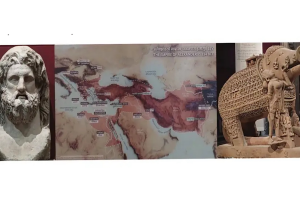Uneasiness prevailed in the Parliament when a new booklet by the Lok Sabha speaker listing out unparliamentary words was released. Words, of course, are too powerful; they reach into the innermost caves of the human mind. Considering the powerful force in the words one utters, it is desirable that one must be disciplined enough to speak in a way that covers gentleness and humility. Somewhere in Boswell’s Life of Johnson, there is an anecdote of a discussion in front of a Spanish literary man, who had no English. He was asked to listen to the conversation of a group of English friends until he heard a word which struck him as particularly beautiful. He stopped the company at the word cellar ~ door, and indeed if one were to write it as Selador, it would sound like the secret name for a prince of Arabia. Words have a beauty or an ugliness which is independent to their meaning. Who cannot hear that alopecia is beautiful, and brunch is ugly, without reference to their sense? Alopecia is one of the most beautiful words in the English language, though it derives from the Latin for fox- mange.
Gary Chapman in his book Love as a Way of Life uses the vivid metaphor for words as being either bullets or seeds. If one uses words as bullets with a feeling of condemnation, one is not able to restore a relationship to love. If one uses words as seeds with a feeling of sincere goodwill, one may rebuild a relationship in positive and life-affirming ways. Quantum Physics determines that physical matter does not exist ~ everything is just energy in different states of vibration. Werner Heisenberg observed, “Atoms or elementary particles themselves are not real; they form a world of potentialities or possibilities; rather than one of things or facts”. It is this everything which vibrates at innumerable subtle frequencies that cause it to appear as all the different creations we find in the physical world. Thus, it seems life is more of an energy flow than a collection of solid things. So, if one stays conscious of the energy one contains based on emotions one feels, one may make choices that create the realities one desires. With positive energetic vibration one can bring good into one’s life.
Words can be powerful tools that can be used to raise physical energy. Even the words of others can affect our personal vibrations. In his series of books, beginning with The Hidden Message in Water, Masaru Emto detailed some of the most fascinating experiments on the effect that words have on energy. The Japanese scientist poured pure water into vials labeled with negative words like “I hate you”. The water was frozen and yielded gray misshapen clumps instead of lace-like crystals. In contrast, when he placed labels that said things like “I love you” on the vials of polluted water, they produced gleaming crystals. His observation was that energy generated by positive or negative words can change the physical structure of an object. To test the power of spoken words, Emto placed two cups of cooked white rice in separate jars and fixed the lids in place, labeling one jar “Thank you” and the other “You fool”. Pupils in a school were to speak the words inscribed on the labels to the corresponding jars twice a day.
After a month, the rice in the jar inflicted with negative comment shriveled into a black mass, while the rice in the jar with regular compliments had a dramatic effect. It was as white and fluffy as the day it was made. The experiments were conducted with water as sound vibration travels through water much faster than it does through air. Considering that our body is nearly 70 per cent water, we may realize how quickly the vibration from negative words can resonate in our cells. We are led to consider how many times we call somebody stupid, ugly, and untalented, and the person begins to understand how this internal propaganda can shape his or her self-image. The choices we make with our language sets the parameters for our lives. The real power of words is their meaning and interpretation. If we constantly utter negative language, we may be allowing the power of words to work against the person in question. Telling somebody that he is fat, weak, worthless, or stupid can sap him of his power to find the positive meaning. Some of the power comes from the words themselves, and some come from the emotion and intensity with which they are used.
If we say “I hate you” in a wanton manner, with a smile, we may receive a different reaction than if we shout it in an aggressive tone. We know that ‘cool’ today is one of the frequently used words, particularly with youngsters. This word can take on any meaning one likes. It could mean “it’s totally not cool”; it could mean “stop talking to me” or anything under the sun. In fact, people love to hate, and expression of hateful words is not exactly always an Indian phenomenon. However, when Heinrich Heine says about one of his detractors, “Ordinarily he is insane, but he has lived moments when he is only stupid”, he is giving the “sharpest blow without using harsh language”. Here, the effective insult is not exactly the use of particularly obnoxious language. British MPs, like Indians, are prone to spending their time by insulting each other. Benjamin Disraeli, when asked to give his opinion of Lord John Russell, said, “If a traveller was informed that such a man was the leader of the House of Commons, he might begin to comprehend how the Egyptians worshipped an insect”. Lord Curzon, after visiting an industrial area, had commented, “I never knew the lower classes had such white skins.” Churchill had once directed his invective against Hitler ~ “This bloodthirsty guttersnipe launches his mechanized armies upon new fields of slaughter, pillage and devastation”.
He said during one of his election campaigns, “My opponent has a problem. He won’t get elected unless things get worse ~ and things won’t get worse ~ unless he gets elected.” The words of others can also be wrongly interpreted based on our own emotional lens. Our ability to find love and joy rely heavily on the frequency of those words being sought, expressed, received, or understood. There are some words which cannot be defined by others, only by our own selves. We may not allow the definition of the word success that is not in our own control. Nor must we tolerate hankering after an underdefined word, happiness. Language is a richer repository of wealth than a store of jewels. Did not Oliver Holmes say, “Every language is a temple in which the soul of those who speak it is enshrined”?











